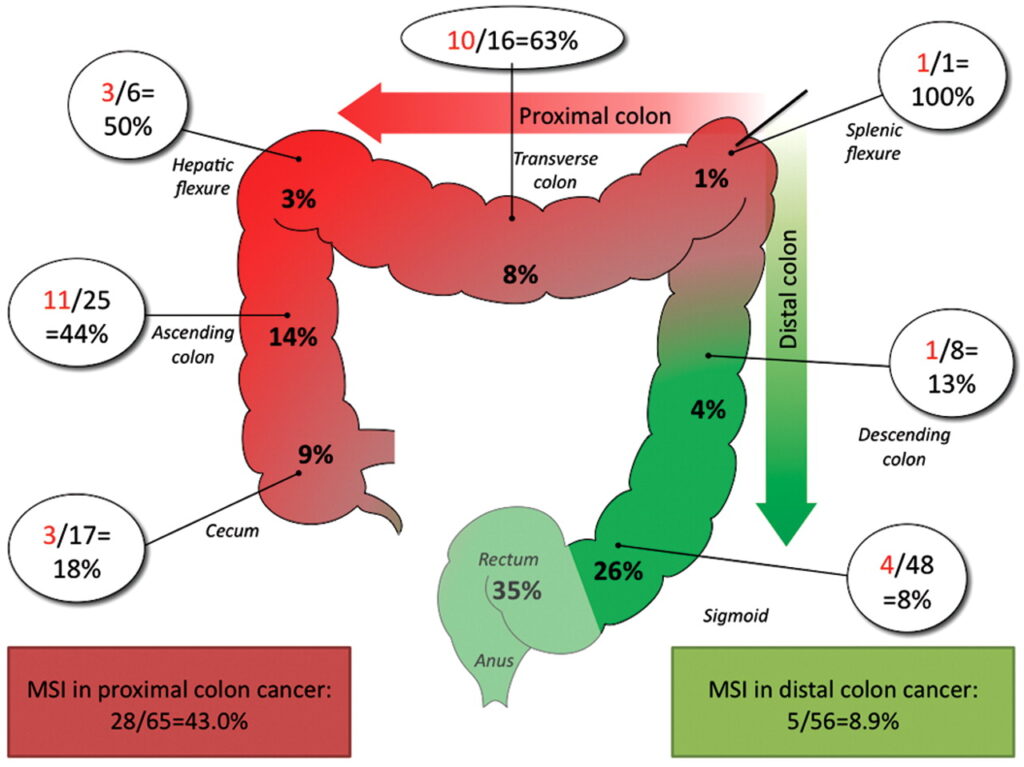Microsatellite instability-high (MSI-H) colorectal cancer is a distinct subtype characterized by genetic hypermutability due to deficient DNA mismatch repair (dMMR). This subtype plays a crucial role in cancer prognosis, treatment decisions, and genetic screening. Understanding MSI-H colorectal cancer is essential for accurate diagnosis and effective management.

What is Microsatellite Instability (MSI)?
Microsatellites are short, repetitive DNA sequences scattered throughout the genome. When mismatch repair (MMR) proteins fail to correct errors during DNA replication, these sequences accumulate mutations, leading to microsatellite instability (MSI). Based on the level of instability, colorectal cancer (CRC) is classified as:
- MSI-H (High): Significant instability in microsatellite regions.
- MSI-L (Low): Limited instability.
- MSS (Microsatellite Stable): No detectable instability.
Causes and Risk Factors
MSI-H colorectal cancer is primarily caused by mutations or epigenetic silencing of mismatch repair genes (MLH1, MSH2, MSH6, PMS2). Key risk factors include:
- Lynch Syndrome (Hereditary Nonpolyposis Colorectal Cancer, HNPCC): A genetic condition increasing MSI-H CRC risk.
- Sporadic MSI-H CRC: Often due to MLH1 promoter hypermethylation.
- Aging: Increased risk with age.
- Environmental and Lifestyle Factors: Smoking, diet, and chronic inflammation contribute to CRC development.
Diagnosis of MSI-H Colorectal Cancer
MSI Testing Methods
- Polymerase Chain Reaction (PCR): Identifies mutations in microsatellite markers.
- Immunohistochemistry (IHC): Detects MMR protein expression loss.
- Next-Generation Sequencing (NGS): Comprehensive genomic profiling.
- MLH1 Promoter Methylation Testing: Determines epigenetic silencing in sporadic MSI-H CRC.
Prognosis and Clinical Significance
- Better Prognosis in Early Stages: MSI-H tumors show lower metastatic potential in early-stage CRC.
- Resistance to Traditional Chemotherapy: MSI-H CRCs often exhibit resistance to 5-fluorouracil (5-FU)-based chemotherapy.
- Increased Immunogenicity: High mutation load enhances immune response, making MSI-H tumors ideal candidates for immunotherapy.
Treatment Strategies
1. Immunotherapy
- Checkpoint Inhibitors:
- Pembrolizumab and Nivolumab target PD-1/PD-L1 pathways.
- Highly effective in metastatic MSI-H CRC.
- CTLA-4 Inhibitors: Used in combination with PD-1 inhibitors for improved response.
2. Surgery
- Early-stage MSI-H CRC patients often undergo curative resection.
- Lymph node dissection ensures comprehensive treatment.
3. Chemotherapy Considerations
- MSI-H tumors are less responsive to 5-FU but may respond to oxaliplatin-based regimens.
- Chemotherapy is typically used when surgery and immunotherapy are insufficient.
4. Targeted Therapy
- Research is ongoing into novel targeted treatments, including BRAF and MEK inhibitors for certain MSI-H tumors.
Screening and Genetic Counseling
Who Should Be Tested for MSI-H CRC?
- Individuals diagnosed with CRC under 50 years of age.
- Patients with multiple Lynch syndrome-related cancers.
- Family history of MSI-H colorectal, endometrial, or gastric cancers.
- All CRC patients, per universal screening guidelines.
Future Perspectives
- Advancements in personalized medicine may further refine MSI-H CRC treatment.
- Liquid biopsy techniques offer non-invasive MSI detection.
- Ongoing clinical trials explore combination immunotherapies and novel agents.
Microsatellite instability-high (MSI-H) colorectal cancer is a distinct molecular subtype with unique diagnostic, prognostic, and therapeutic implications. Immunotherapy has revolutionized treatment outcomes, offering new hope for patients with MSI-H CRC. Early detection and genetic screening remain critical for optimal management.

